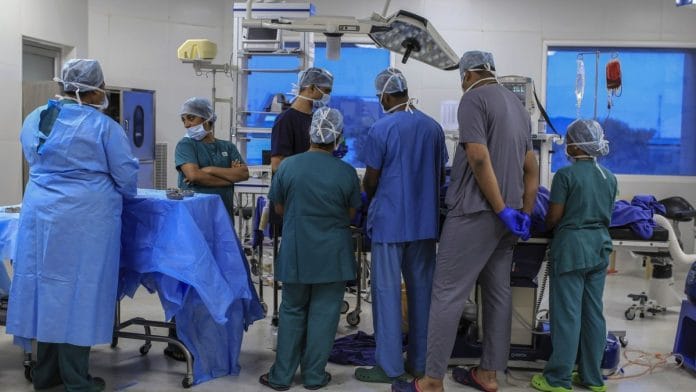On 7 April 1948, the Constitution of the World Health Organization was adopted. The date is celebrated every year as World Health Day, an occasion to examine the needs and gaps in healthcare systems across the world.
This year, when the world is battling a pandemic, the likes of which it has not seen before, World Health Day becomes all the more important. Global leaders and healthcare professionals need to create a comprehensive plan to tackle the problems of access, lack of protective gear for hospital staff, lack of ventilators and other equipment, and other issues to provide customised solutions for countries that have different needs.
India’s public health system by numbers
A report released by the government in October 2019 stated that in 2017-18, India had spent only 1.28 per cent of its GDP on public healthcare and Rs 1,657 per capita. This is lesser than even smaller countries with lower incomes, including Nepal, Bhutan and Timor Leste.
Health insurance, too, isn’t something every Indian has.
India’s largest national survey on social consumption, conducted between July 2017 and June 2018, showed that just about 10 per cent of the poorest one-fifth of Indians in rural (10.2%) and urban (9.8%) India had any form of private or government health insurance.
The coronavirus pandemic has thrown into sharp relief the gaps between the different economic strata in countries, especially in India. Prime Minister Narendra Modi’s hours notice for a three-week national lockdown upended lives, but none more so than for the poor, the homeless, the daily wagers and migrant workers. For these groups of people, social distancing is not an option and work from home doesn’t exist.
Given the lack of transport options, migrant labourers walked 300-400 kilometres to their homes in India’s hinterlands. Special monetary packages and relief measures were announced by the Centre and some state governments only after reports of death, and other hardships emerged, causing widespread outrage.
Also read: India has 40,000 ventilators but could need many, many more in ‘worst-case scenario’
Celebrating nurses and midwives
This WHO has designated this year as the International Year of the Nurse and the Midwife to honour their work and raise awareness about the crucial, and often unseen role they play in ensuring quality and empathetic healthcare.
The theme is especially significant for India this year, which has seen many healthcare workers suffer not only from the lack of protective gear while dealing with Covid-19 cases, but also because of the social stigma attached to the virus. There were reports of medical personnel being evicted from their homes by landlords and being ostracised and abused by community members on suspicion of being carriers of the infection.
Also read: ‘Inadequate protective gear, unclean clinics’ — why AAP’s mohalla doctors want to stay home






